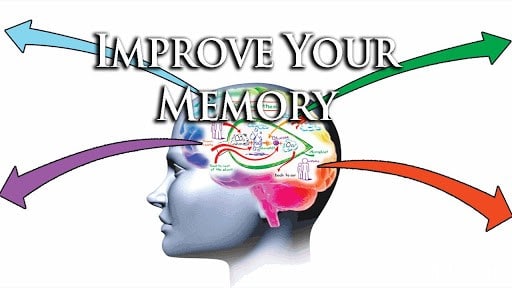7 TIPS TO HELP IMPROVE YOUR MEMORY

Memory is the faculty of the brain by which data or information is encoded, stored, and retrieved when needed. It is the retention of information over time for the purpose of influencing future action.
The struggle of living with a feeble memory is very real and you are not the only one facing it. Contrary to what most people believe, memory slips are not indicative of or exclusive to old age alone. We are confronted by a flood of information on a daily basis, which can often get quite overwhelming to process, retain, and recollect.
Memory is what gives a person their identity and individuality, as without it you will not be able to learn new information, form lasting Autism relationships, or go about your daily life functions. Your memory reserve is a malleable entity that can be built upon with every new experience and learning.
The act of memorizing any information follows a 3-part process.
The first stage entails encoding or processing the information in visual, acoustic, or semantic form. This is followed by the storage of information as sensory, short-term, or long-term memory. To consolidate the information into the long-term memory, you must use it repeatedly. The final stage of the memory process involves retrieving the information stored in your brain files.
However, just as memory can be enhanced, it can also suffer a natural decline with advancing age. Moreover, issues such as dementia, brain trauma, and persistent stress can impair your memory function a great deal.
- Side effects of antidepressants, antihistamines, anti-anxiety medications, sleeping pills, and pain medications
- Alcohol, tobacco, or drug use
- Sleep deprivation
- Depression
- Bipolar disorder
- Too much stress and anxiety
- Nutritional deficiency, especially vitamin B1, B12, and D.
- Head injury
- The underactive or overactive thyroid gland
- Infections such as HIV, tuberculosis, and syphilis
Dementia, Alzheimer’s disease, and other conditions can also cause memory problems along with other symptoms.
Table of Contents
TIPS TO IMPROVE YOUR MEMORY
1. Reduce Stress Level
Living under too much stress is not at all good for your cognitive health. Being under stress can make it difficult to remember or recall things.
During stress, the hormone cortisol is released. This particular hormone impairs the brain’s memory process. Also, too much stress, in the long run, can destroy brain cells and damage the hippocampus, the section of the brain that forms new memories and stores old ones.
So, it is better to reduce your stress level. Meditation, joining a laughter class, taking a hobby, cooking, spending time amidst nature, or talking with a friend can help reduce stress.
2. Try Meditation and Other Methods of Improving Focus
Both memory and focus fall under the purview of the same neural territory in the brain. Thus, any attempt to enhance focus will inadvertently improve your memory as well. Meditation is one such practice that helps improve your focus, and it has been found to have a positive bearing on your memory.
Meditation is particularly recommended for strengthening your working memory, which is the immediate short-term information that you need to access to go about your day. This type of memory has a fairly limited capacity and does not sustain for a long period. However, it helps you to simultaneously preserve and process temporary information to carry out complex cognitive tasks such as learning, reasoning, and decision making.
3. Avoid Multitasking
Multitasking has become an essential life skill to keep up with the frenzied schedules that define modern times. Everyone is in a rush to get more done in less time, a feat that is often accomplished by pursuing several different activities all at once.
While this strategy may check more boxes off your to-do list, it leaves your headspace a bit muddled. You cannot expect to give your complete attention to any one task when you are thinking in all these different directions. And not everyone is adept at multitasking; in fact, most can really only pay attention to one activity at a time.
When you switch your attention to different activities, it is hard to retain all the information about everything you are doing. You tend to get inundated by the multiple tasks weighing on your mind, leading to confusion, oversights, memory slips, and miscalculations.
The more you switch, the more information will fall through the cracks of your memory. Prioritizing your tasks will help you avoid information overload and keep your wits about you.
4. Get Sound Sleep
Sleep deprivation can take a toll on both your physical and mental health.
It is during sleep that your brain goes through a sort of review process. Disturbances in sleep can affect your brain’s ability to retain or recall information.
A 2005 study published in Neuroscience reports that a good night’s sleep triggers changes in the brain that help improve memory.
Another study published in 2007 in Neuropsychiatric Disease and Treatment reports that while total sleep deprivation can affect attention and working memory, partial sleep deprivation has a direct impact on attention especially vigilance.
So, no matter how busy your schedule is, do not ignore the importance of sleep. Try to go to bed at the same time each day and get at least 6-7 hours of sound sleep.
5. Exercise Daily
Regular exercise is good for your physical and mental health. Exercise helps more oxygen and nutrient-carrying blood reach the brain. Also, being physically active significantly reduces the risk of several diseases that can lead to memory loss.
According to a recent guideline released by the American Academy of Neurology, exercising twice a week can help improve thinking ability and memory in people with mild cognitive impairment (MCI)
A 2018 study published in Neurology reports that exercising is positively associated with improved cognitive performance in older adults with and without cognitive impairment.
Try to exercise at least 5 days a week. You can include different types of exercise into your daily schedule, such as cardio, high-intensity interval training, stretching, yoga, and strength training.
6. Give Your Brain a Workout
All the information that you acquire leaves a mental footprint in the form of a neural pathway. People continue to develop millions of neural pathways over the course of their lifetime; this makes everyday cognitive functioning possible.
It is on account of these connections within your brain that you are able to process and recall information quickly, solve familiar problems, and execute habitual tasks with the least bit of mental effort.
It is very important to cultivate an inquisitive outlook if you wish to add to this stock of neural pathways. Keeping yourself from seeking new experiences and information will make your brain quite dull and worn-out.
Even though your brain is not a muscle per se, it definitely acts like one. Just like you need to flex and work out your muscles to retain their strength, you need to exercise your mental functioning, too.
7. Chunk Complex Information
Chunking involves breaking down complex information into smaller chunks or groups to make it easy to memorize.
This is perhaps the most standard and oldest memorization technique used for simplifying complicated data and committing it to memory, particularly in the case of multi digit numbers such as ID numbers and telephone numbers as well as difficult spellings.
To make this method a success, it is best that you group the data according to a meaningful pattern. The memory acquired through mindless rote learning may fade after a while, but if you form well-founded associations between each group to give order to the data, it will stick for longer. This approach will make it easier for you to learn, retain, and recollect the information.
Chunking is the most preferred option for learning complex data, especially if the order of the items to be learned is inconsequential.
For any important information please contact us Email GadgetsNg info@gadgetsng.com
[Button id="1"]



